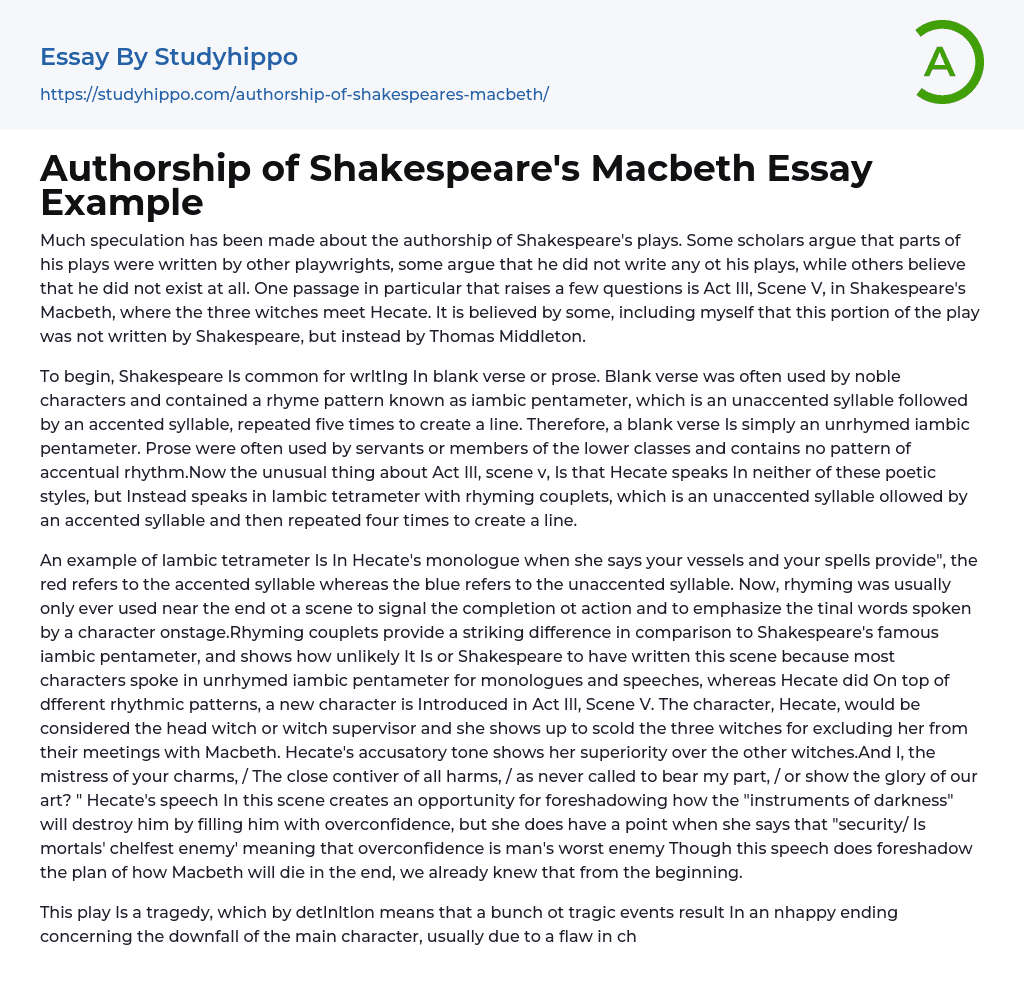Much speculation has been made about the authorship of Shakespeare's plays. Some scholars argue that parts of his plays were written by other playwrights, some argue that he did not write any ot his plays, while others believe that he did not exist at all. One passage in particular that raises a few questions is Act Ill, Scene V, in Shakespeare's Macbeth, where the three witches meet Hecate. It is believed by some, including myself that this portion of the play was not written by Shakespeare, but instead by Thomas Middleton.
To begin, Shakespeare Is common for wrltlng In blank verse or prose. Blank verse was often used by noble characters and contained a rhyme pattern known as iambic pentameter, which is an unaccented syllable followed by an accented syllable, repeated five times to create a line. Therefore,
...a blank verse Is simply an unrhymed iambic pentameter. Prose were often used by servants or members of the lower classes and contains no pattern of accentual rhythm.Now the unusual thing about Act Ill, scene v, Is that Hecate speaks In neither of these poetic styles, but Instead speaks in Iambic tetrameter with rhyming couplets, which is an unaccented syllable ollowed by an accented syllable and then repeated four times to create a line.
An example of Iambic tetrameter Is In Hecate's monologue when she says your vessels and your spells provide", the red refers to the accented syllable whereas the blue refers to the unaccented syllable. Now, rhyming was usually only ever used near the end ot a scene to signal the completion ot action and to emphasize the tinal words spoken by a character onstage.Rhyming couplets
provide a striking difference in comparison to Shakespeare's famous iambic pentameter, and shows how unlikely It Is or Shakespeare to have written this scene because most characters spoke in unrhymed iambic pentameter for monologues and speeches, whereas Hecate did On top of dfferent rhythmic patterns, a new character is Introduced in Act Ill, Scene V. The character, Hecate, would be considered the head witch or witch supervisor and she shows up to scold the three witches for excluding her from their meetings with Macbeth. Hecate's accusatory tone shows her superiority over the other witches.And l, the mistress of your charms, / The close contiver of all harms, / as never called to bear my part, / or show the glory of our art? " Hecate's speech In this scene creates an opportunity for foreshadowing how the "instruments of darkness" will destroy him by filling him with overconfidence, but she does have a point when she says that "security/ Is mortals' chelfest enemy' meaning that overconfidence is man's worst enemy Though this speech does foreshadow the plan of how Macbeth will die in the end, we already knew that from the beginning.
This play Is a tragedy, which by detlnltlon means that a bunch ot tragic events result In an nhappy ending concerning the downfall of the main character, usually due to a flaw in character or conflict with some overpowering force. In Macbeth, the tragic events are that Macbeth kills a bunch ot people to get the crown and protect himselt trom losing the crown which results in a battle where Macbeth ends up dead because of his overconfidence and greed.Even though foreshadowing Is found In
this scene, it did not write this scene. However, Hecate is where Thomas Middleton enters the picture.
In the ending of Act Ill, Scene V, there is a stage direction stating that music and a song is being layed from behind the stage and includes only the first words of each of the songs: "Come away, come away," and "Black spirits. " Each of these songs is found in the only other play of that period to feature a witch named Hecate: Thomas Middleton's The Witch.The thought by many scholars is that while Thomas Middleton was working for the Kings Men at the time, that he was asked to improve the Shakespeare's Macbeth by adding in new scenes and dialogue featuring Hecate, the character from The Witch. However, if Middleton was the man to write Act Ill, Scene V, it wouldn't have een until later after the play had been completely written, therefore saying that Thomas Middleton revised Shakespeare's Macbeth by trying to add his songs and character, Hecate from The Witch.In conclusion, I think that though Shakespeare composed most of Macbeth, he did not write Act Ill, Scene V due to the change in poetic rhythm, continuous rhyming couplets, a lack of plot development, and due to the fact that there are clues leading you to Thomas Middleton's The Witch.
Though I believe that Thomas Middleton wrote Act Ill, Scene V, it is still considered Shakespeare's Macbeth.
- Book Summary essays
- Metaphor essays
- Reader essays
- Rhyme essays
- Literary devices essays
- Villain essays
- Books essays
- Genre essays
- Literary Criticism essays
- Writer essays
- Protagonist essays
- Simile essays
- Poem essays
- Book Report essays
- Book Review essays
- Greek Mythology essays
- Plot essays
- Tragic Hero essays
- Coming of Age essays
- Play essays
- Rhetoric essays
- Rhetorical Question essays
- Translation essays
- Understanding essays
- Reason essays
- Character essays
- Letter essays
- American Literature essays
- Literature Review essays
- Utopia essays
- Poetry Analysis essays
- Dante's Inferno essays
- Between The World and Me essays
- Incidents in The Life of a Slave Girl essays
- Flowers for Algernon essays
- Myth essays
- Everyday Use essays
- Boo Radley essays
- Genesis essays
- Richard iii essays
- Alice in Wonderland essays
- On the road essays
- Ozymandias essays
- The Nightingale essays
- Holden Caulfield essays
- Animal Farm essays
- 1984 essays
- A Hanging essays
- Shooting An Elephant essays
- A Tale Of Two Cities essays




